|
|
|
Sort Order |
|
|
|
Items / Page
|
|
|
|
|
|
|
| Srl | Item |
| 1 |
ID:
133430


|
|
|
|
|
| Publication |
2014.
|
| Summary/Abstract |
This paper analyses anti-corruption efforts in post-conflict Liberia. It highlights citizens' views on the definition of corruption and argues that, in the past, anti-corruption efforts have often focused on institution building and formal justice mechanisms without sufficient understanding of accountability dynamics on the ground. Anti-corruption approaches in Liberia have only nominally examined whether there is a shared understanding of what 'corruption' is and why it is regarded as a problem. The paper examines the social norms and perceptions that underlie understandings of the term corruption. It argues that the international community may have overlooked the fact that 'corruption' has become an all-encompassing term that masks a myriad of differing priorities and concerns. The authors posit that 'accountability' may be a more useful lens for those actors hoping to improve governance in these contexts.
|
|
|
|
|
|
|
|
|
|
|
|
|
|
|
|
| 2 |
ID:
134293
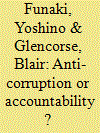

|
|
|
|
|
| Summary/Abstract |
This paper analyses anti-corruption efforts in post-conflict Liberia. It highlights citizens’ views on the definition of corruption and argues that, in the past, anti-corruption efforts have often focused on institution building and formal justice mechanisms without sufficient understanding of accountability dynamics on the ground. Anti-corruption approaches in Liberia have only nominally examined whether there is a shared understanding of what ‘corruption’ is and why it is regarded as a problem. The paper examines the social norms and perceptions that underlie understandings of the term corruption. It argues that the international community may have overlooked the fact that ‘corruption’ has become an all-encompassing term that masks a myriad of differing priorities and concerns. The authors posit that ‘accountability’ may be a more useful lens for those actors hoping to improve governance in these contexts.
|
|
|
|
|
|
|
|
|
|
|
|
|
|
|
|
| 3 |
ID:
174986


|
|
|
|
|
| Summary/Abstract |
The provision of feedback about individual electricity consumption is a widely used approach to promote pro-environmental behavior. This form of feedback typically invokes social comparisons by informing households about their aggregate electricity consumption relative to others. While previous research has shown that aggregate consumption feedback translates into significant energy savings, the potential for further reductions may remain untapped because households lack knowledge about their appliance energy consumption patterns. In this paper, we present evidence from a field experiment, where we provide residents with feedback about their electricity consumption, specific to a high-energy use appliance (i.e. air-conditioner). We provide the relevant social norm information by varying the reference group of each resident. We find that our appliance-specific feedback is a powerful tool to curb electricity consumption. Residents significantly reduce their average air-conditioning usage by 17% in our treatment groups. Notwithstanding, our effects are not driven by comparative feedback with respect to different reference groups. We interpret this as encouraging evidence to promote the use of appliance-specific feedback to realize energy savings.
|
|
|
|
|
|
|
|
|
|
|
|
|
|
|
|
| 4 |
ID:
183577
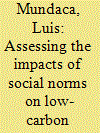

|
|
|
|
|
| Summary/Abstract |
Policymakers and scientists are paying increasing attention to how social norms can promote pro-environmental behaviour and sustainable energy use. We contribute to this field by experimenting with and assessing the impacts of social norms on low-carbon mobility options. Taking Sweden as a case study, we develop two complementary randomised controlled experiments to: 1) analyse the role of social norms in promoting the adoption of car sharing services (CSS) via descriptive and injunctive norms (N = 720); and 2) investigate potential crowd out effects when injunctive norms are used to promote a low-carbon transport hierarchy (N = 730). First-order effects show that social norms have a positive but marginal impact on the willingness to adopt CSS, and only injunctive norms have the potential to steer behaviour in the desired direction. Results also suggest that concerns about potential substitution effects between low-carbon transport options and CSS are not valid. With due limitations, our findings have various implications for policymaking, notably that for social norms to be effective, other policy instruments are critically needed. Of particular importance are the environmental effectiveness of CSS and complementarities between public transport and active mobility (i.e. walking and cycling).
|
|
|
|
|
|
|
|
|
|
|
|
|
|
|
|
| 5 |
ID:
133030
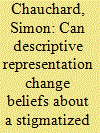

|
|
|
|
|
| Publication |
2014.
|
| Summary/Abstract |
Can descriptive representation for a stigmatized group change the beliefs and intentions of members of dominant groups? To address this question, I focus on quotas (reservations) that allow members of the scheduled castes to access key executive positions in India's village institutions. To measure the psychological effect of reservations, I combine a natural experiment with an innovative MP3-player-based self-administered survey that measures various beliefs and behavioral intentions. Results provide credible causal evidence that reservations affect the psychology of members of dominant castes. Even though villagers living in reserved villages continue to think poorly of members of the scheduled castes (stereotypes do not improve), reservation affects two other types of beliefs: perceived social norms of interactions and perceived legal norms of interactions. These changes in beliefs in turn appear to have far-reaching consequences for intercaste relations, as villagers' discriminatory intentions also decrease under reservation.
|
|
|
|
|
|
|
|
|
|
|
|
|
|
|
|
| 6 |
ID:
166977
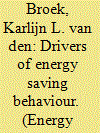

|
|
|
|
|
| Summary/Abstract |
Campaigns aiming to induce energy saving behaviour among householders use a wide range of approaches that address many different drivers thought to underpin this behaviour. However, little research has compared the influence of the different processes that influence energy behaviour, meaning campaigns are not informed about where best to focus resources. Therefore, this study applies the Comprehensive Action Determination Model (CADM) to investigate the relative influence of intentional, normative, situational and habitual processes on energy saving behaviour. An online survey on a sample of Western European households (N = 247) measured the CADM variables and data were analysed using structural equation modelling. Results showed that 1) the model was able to account for a large amount of variance in energy saving behaviour and 2) situational and habitual processes were best able to account for energy saving behaviour while normative and intentional processes had little predictive power. These findings suggest that policy makers should move away from motivating householders to save energy and should instead focus their efforts on changing energy habits and creating environments that facilitate energy saving behaviour. These findings add to the wider development in social and environmental psychology that emphasizes the importance of extra-personal variables in shaping behaviour.
|
|
|
|
|
|
|
|
|
|
|
|
|
|
|
|
| 7 |
ID:
122521
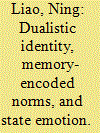

|
|
|
|
|
| Publication |
2013.
|
| Summary/Abstract |
By tracing the origin and evolution of Chinese nationalism, this paper finds that the dialectical relationship between the Chinese "self" and the foreign "other" has provided the cultural-institutional context for the construction of its national identity. The positional change of the Chinese actor in the self-other interaction-resulting from the institutional shift from the tianxia order to the Westphalian system-and the consequent national humiliation have been embedded in the Chinese collective memory and given rise to the consensual norms ingrained in the national identity. Viewed through the lens of political sociology and identity politics, China's tenacious struggle for national rejuvenation can be construed as a social practice guided by these memory-encoded social norms. Due to the protracted and ambivalent nature of the state's purposive action in attaining great-power status on the international stage, the confidence of the resurgent state is compromised by an acute sense of frustration. This identity predicament has engendered a peculiar Chinese state emotion, which has profoundly influenced the in-group members' evaluation and perception of out-group entities and their behavior in the antagonistic intergroup relations.
|
|
|
|
|
|
|
|
|
|
|
|
|
|
|
|
| 8 |
ID:
150915


|
|
|
|
|
| Summary/Abstract |
Community-based renewable energy initiatives may be important actors in the transition toward low-carbon energy systems. In turn, stimulating investments in renewable energy production at the community level requires a better understanding of investors' motives. This paper aims to study the heterogeneity of motivations that drive individuals to participate in community renewable energy projects and the underlying explanatory factors behind this, as well as the implications for their level of engagement in initiatives. Based on quantitative data from an original survey conducted with two renewable energy cooperatives in Flanders, the statistical analysis shows that cooperative members should not be considered as one homogeneous group. Several categories of members with different motives and levels of engagement can be distinguished. This heterogeneity is explained by contrasts in terms of institutional settings, spatial patterns and attitudes to the diffusion of institutional innovations. Regarding policy implications, the findings suggest that this heterogeneity should be taken into account in designing more effective supporting policies to stimulate investments at the community level. The activation of social norms is also shown to be a promising mechanism for triggering investment decisions, although the implications of its interplay with economic incentives should be further explored.
|
|
|
|
|
|
|
|
|
|
|
|
|
|
|
|
| 9 |
ID:
184993
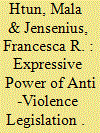

|
|
|
|
|
| Summary/Abstract |
We know more about why laws on violence against women (VAW) were adopted than about how much and in what ways these laws affect society. The authors argue that even weakly enforced laws can contribute to positive social change. They theorize the expressive power of VAW legislation, and present evidence for a cautiously optimistic assessment of current trends on violence against women and the ways that VAW laws affect social norms. Focusing on a time of major legal change related to VAW in Mexico, this article explores trends in behavior and attitudes related to violence by analyzing four waves of the National Survey on the Dynamics of Household Relations (ENDIREH), which include detailed interviews with thousands of Mexican women. The authors find that over this period, the share of women experiencing intimate-partner abuse declined, attitudes condoning violence shifted, reporting rates rose, and most women learned about legislation to protect their rights. These changes are consistent with the authors’ expectations about the expressive power of anti-violence legislation.
|
|
|
|
|
|
|
|
|
|
|
|
|
|
|
|
| 10 |
ID:
180104
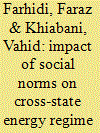

|
|
|
|
|
| Summary/Abstract |
We present a survey study that explores two experimental analysis: first, a cross-country norms effect on petition signing, and second, a cross-state comparison, focusing on clean energy adaptation instead of fossil fuel energy. In the first study, we use energy consumption information from the US, EU, and China. Using the first study as a pilot, we redesigned the second experiment by providing energy utilization for Arizonian and New Mexican to validate our norms by comparing their states' green energy consumption to the pioneer states separately. The results of the research point out that social norms can effectively influence the participants in different angles. The attendants are more likely to sign a petition—by seven percent—in favor of clean energy act when they have been provided with additional information. This research highlights that not only social norms could be compelling individuals’ behavior, but also that they are sensitive to the types of information which are disclosed to them.
|
|
|
|
|
|
|
|
|
|
|
|
|
|
|
|
| 11 |
ID:
173956
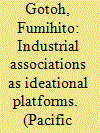

|
|
|
|
|
| Summary/Abstract |
Significant wage and treatment differentials between regular workers in long-term employment and precarious non-regular workers have been a major political issue in Japan since the mid-1990s. I argue this phenomenon was caused by Japanese society’s resistance to American neoliberal hegemony. Why has Japan resisted it, and how has the resistance resulted in the rapid increase in the working poor? I contend anti-liberal, anti-free market norms of Japanese society centred on ‘systemic support’ have bolstered resistance to convergence in order to prevent capitalist dominance from severing long-term social ties, such as management-labour cooperation. My broadened definition of systemic support incorporates dominant elites’ support and protection of subordinates in exchange for their loyalty and obedience. This paper will explore reasons for the resistance to convergence by examining an ideational conflict within Japanese elites between the market liberalisation and anti-free market camps, particularly between two major industrial associations, Keidanren and Keizai Doyukai, which have played a key role as ‘ideational platforms’ for Japanese corporate society. Under the Hashimoto (1996-8) and Koizumi (2001-6) administrations, the market liberalisation camp gained influence, but since 2006, both the anti-free market camp and its subordinates (e.g. regular workers) have driven anti-neoliberal backlash.
|
|
|
|
|
|
|
|
|
|
|
|
|
|
|
|
| 12 |
ID:
182759


|
|
|
|
|
| Summary/Abstract |
The population in urban China has shown rising age at first marriage and declining marriage rates, especially among college educated professional women who are in their late 20s or their 30s. We investigate the determinants of marriage formation for urban women aged 27 or above who tend to be termed “leftover ladies”. We estimate a recursive mixed-equation model to describe correlated profiles of career, education and marriage. Conventional social norms on gender, especially patriarchy, still prevail. Factors that are not favorable for a conventionally wifely role reduce women's likelihood of marriage. In particular, we reveal a “marital college-discount” of college education. It reduces the probability of marriage by 2.88%–3.6% and a postgraduate degree further oppresses it by 8.4%–10.4%. Favorable characteristics such as facial attractiveness only raises the likelihood of marriage formation for non-college educated women, while pushing up non-marriage probabilities for women with at least college degrees.
|
|
|
|
|
|
|
|
|
|
|
|
|
|
|
|
| 13 |
ID:
190641
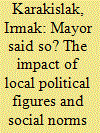

|
|
|
|
|
| Summary/Abstract |
Wind energy plays an important role in the energy transition. However, many wind energy projects result in conflicts at the local level. Mayors and local council members are key actors who can play a supportive, moderating, escalating, or mediating role in siting decisions about wind energy. Further, communities' social norms encapsulate their beliefs about what a wind energy project should be like. Alongside public expectations, these norms indicate the layers of cultural dynamics and standards of communities. Hence, this study investigates the dynamics of local responses to wind energy projects and their outcomes. This is achieved through an empirical-qualitative approach in which the experiences of four Bavarian case studies in Germany are illustrated using document analysis and in-depth interviews. The results of this study indicate that mayors play a crucial role in local responses to wind energy projects in Bavaria. Their support is necessary but not sufficient for local acceptance. Other stakeholders, next to project characteristics and communication, as well as external events, also have an impact on local responses over time. The paper concludes with lessons learned about communication and information strategies, as the study has implications for policymakers and practitioners in relation to designing and planning wind energy projects.
|
|
|
|
|
|
|
|
|
|
|
|
|
|
|
|
| 14 |
ID:
129483


|
|
|
|
|
| Publication |
2013.
|
| Summary/Abstract |
The interaction of processes of state formation, liberal peacebuilding and statebuilding and localized practices of peacemaking-or what might be called peace formation-offer the prospect of forms of peace that may be both locally and internationally legitimate. Post-liberal and hybrid forms of peace influenced by local patterns of politics, based on contextual social, cultural and historical, norms, identities, and material resources, as well as cognizant of international norms, not to mention power, may represent a more accurate characterization of the results of peace processes worldwide. This article examines local processes of peace formation and emerging peace infrastructures.
|
|
|
|
|
|
|
|
|
|
|
|
|
|
|
|
| 15 |
ID:
097820
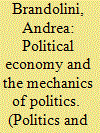

|
|
|
| 16 |
ID:
151699
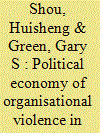

|
|
|
|
|
| Summary/Abstract |
“Organisational violence” involves wilful, illegal business behaviour that has the potential to harm workers, consumers, or the environment. We use a combined perspective from the fields of political economy and criminology to examine the incongruously high level of organisational violence among Chinese firms that exists despite robust efforts by the government to put forth regulatory laws that prohibit it. As the explanation for this incongruity, we assert two conditions that synergistically interact in a bidirectional relationship: 1) the complex legal structural barriers to effective enforcement against organisational violence caused by a politically biased and administratively fragmented Chinese political system, and 2) a socially disorganised business environment that does not recursively message the wrongfulness of organisational violence. The analysis rejects not only financial gain as a relevant factor in the commission of organisational violence but also other current perspectives on the causes of organisational violence in China.
|
|
|
|
|
|
|
|
|
|
|
|
|
|
|
|
| 17 |
ID:
171714
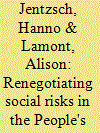

|
|
|
|
|
| Summary/Abstract |
There have been various attempts to capture the direction of welfare provision in Japan and the People's Republic of China (PRC) as a regionally coherent welfare regime, following on from attempts by the welfare regime literature to categorize nation-states by the characteristics of their welfare provision in the West. However, stark differences between the PRC and Japan as regional neighbours, and even within the regions of each country, pose a challenge to this kind of macro-level theorizing. This special issue seeks to supplement macro perspectives on welfare regimes by exploring a range of welfare policies across both states from an ethnographic, bottom-up perspective, which captures the dynamic nature of welfare and highlights the importance of understanding how local actors request, interpret, and implement risk management strategies. The management of social risks is shown not to have one clear direction determined by, for example, market logic: instead, this special issue highlights the ways in which the burden of risk shifts between family, market, state, and communities unevenly over time, reflecting underlying institutional norms which are always up for negotiation. In doing so, this special issue emphasizes the importance of local, contextualized understandings of welfare, and suggests that the comparative welfare regimes literature should seek the micro-institutional foundations of welfare provision as the basis for comparison.
|
|
|
|
|
|
|
|
|
|
|
|
|
|
|
|
| 18 |
ID:
088114
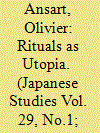

|
|
|
|
|
| Publication |
2009.
|
| Summary/Abstract |
Ogyu Sorai's eighteenth-century theory of rituals pushed to an unsettling conclusion the assumption made popular by many contemporary authors that internalization of social norms is better achieved through the subtle control of bodies and gestures than through coercion, threats or argumentation. Because Sorai's rituals aimed at shaping in everyday life, according to pre-determined status, body gestures, utterances, and all the objects surrounding the body, from clothes to houses, furniture and conveyances, they would have transformed life into a performance of a scripted play. They would also have represented the ideal and absolute form of authority, following Hannah Arendt's famous definition of the concept as that which elicits obedience or conformity without need for coercion or argument. The fluidity inherent in the urban life of Tokugawa Japan, however, made sure that Sorai's utopia would remain just that - and probably explains why Arendt found authority so elusive in our modern societies
|
|
|
|
|
|
|
|
|
|
|
|
|
|
|
|
| 19 |
ID:
132647


|
|
|
|
|
| Publication |
2014.
|
| Summary/Abstract |
In Asian developing countries, energy saving has become a crucial issue in sustainable development. However, in countries that possess weak government regulations and market mechanisms, industries are expected to save energy voluntarily. Therefore, corporate social responsibility (CSR) can serve as an important incentive to encourage companies to take voluntary actions.
In this paper, we analyze CSR recognition and energy-saving actions taken by companies located in two Asian cities. The results of a questionnaire survey revealed that a positive relation exists between CSR recognition and energy saving. In developing countries, CSR develops based on concerns expressed by local cultures and communities. This indicates that the positive relationships that exist between CSR and energy-saving actions reflect the social norms of these communities. The results suggest that policies that encourage companies to enhance their CSR activities in society can serve as effective incentives to encourage energy-saving actions.
|
|
|
|
|
|
|
|
|
|
|
|
|
|
|
|
| 20 |
ID:
174001
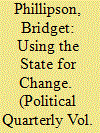

|
|
|
|
|
| Summary/Abstract |
The capacity of the state to deliver transformative social and economic change appears more limited today than since Labour was last in government. A future Labour government will therefore need to reckon with the challenges this presents when it comes to harnessing the power of the state to distribute power, wealth, and opportunity, effectively. This article considers two aspects of state power. The first is the ability of the state to enforce laws, and in doing so shape social and economic norms. With reference to past successes and failures, there is discussion of how laws and regulations could be made more effective. The second aspect is state intervention in the economy, and the circumstances in which it is possible and desirable to nationalise key industries. The case is made for a thorough assessment of the efficiency and efficacy of such interventions in the economy, especially when weighed against other policy priorities.
|
|
|
|
|
|
|
|
|
|
|
|
|
|
|
|
|
|
|
|
|